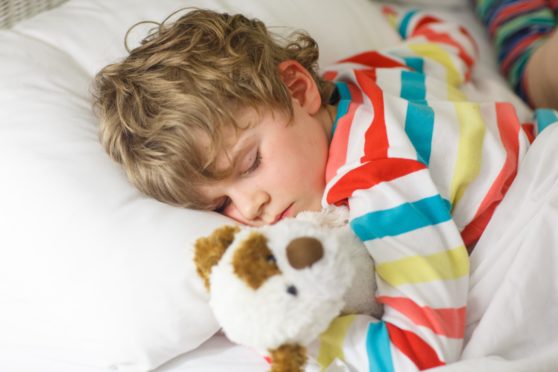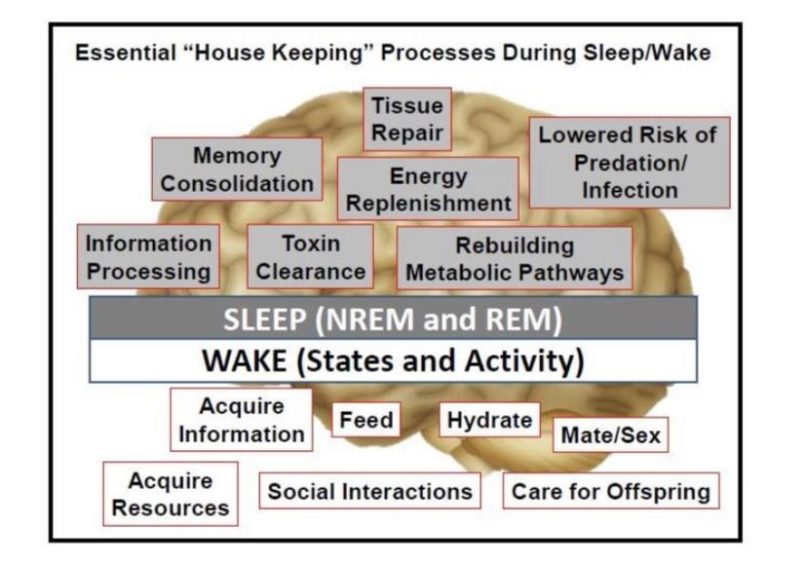A good sleep is vital for our children’s physical and mental wellbeing – it’s also essential parents get enough Zs too. But what are the best tips to help your children get the perfect night’s sleep?
As the saying goes, “happy parent, happy baby”. The two go hand-in-hand – if your child isn’t having a solid night’s sleep, then it’s almost certain you as a mum or dad aren’t getting much kip either.
But having children certainly doesn’t come with a how-to handbook, so what do you do when your little darling won’t sleep or is perhaps suffering from the most terrible night terrors?
We spoke to three experts – including Scotland’s only Fairy Sleep Mother – to help you and your children get the best possible sleep.
How to achieve the perfect bedtime routine
Eileen Macdonald – aka the Fairy Sleep Mother – helps parents achieve their happily ever after when it comes to getting their children in a solid routine.
She proudly states that she can do so within around a two to four week time frame thanks to her personalised programmes.
A qualified sleep consultant, Eileen offers support for children aged from newborn to six years old.
“Bedtime routines are really important and the reason for that is because children need predictability – they need to feel safe so they know what’s coming,” explained Eileen, who is based in Inverness, but offers help to parents across the country.
“If you have the same steps and order every single night, then children will be happy with that.
“Children tend to feel more unsettled and unsafe when things are all over the place. If you don’t have a set routine then they are more likely to play up and it will be more challenging for you as a parent.
“Ultimately, the best bedtime routine I can recommend is giving your children a bath (or a wash of face and hands if you don’t want to do a bath every single night for young children), then to get them into pyjamas so they feel cosy, offer some milk and finally, read a story.
“This helps children to know that although it’s not quite time for sleep, sleep is coming.”
Consistent routine
Eileen said that a consistent bedtime routine such as this will encourage children to learn how to self-settle (take themselves off to the land of nod), therefore achieving a better night’s sleep.
“I know this sounds completely backwards,” she laughed.
“But in order to successfully self-settle, children need to go to bed fully awake. They need to be able to take themselves from being awake to falling asleep by themselves. They learn how to switch their brains off by themselves and take themselves to sleep.”
A qualified nutritional therapist, Beverley Sarstedt of Aberdeen’s Nourishing Insights, also regularly advises parents on what makes for a consistent bedtime routine.
With a particular focus on nutrition, Beverley, who runs her clinic on St Andrew Street alongside her daughter Harriette Robinson, said: “If we look at food then a snack before bed is fine if it’s calming.
“You don’t want to give a child food that is stimulating and you obviously won’t want to give them anything with caffeine. Parents should avoid sugars before bed too.
“Something calming would be like an oatcake. You could combine that with some almond butter or peanut butter.
“Almond is a great source of calcium and magnesium, so that could be a really nice night time snack. It’ll be sustaining through the night.
“That snack could then be combined with a glass of milk or a dairy free alternative.”
She added: “Having snacks like that, alongside a nice wind down night time routine like having a warm bath, would help a child to have a good sleep. Perhaps you could add things like Epsom salts into the bath, or lavender essential oil.”
Kids need different amounts of sleep
While adults need between six to nine hours of sleep each night, the NHS advises children require different durations of sleep, according to their age.
Dr Olga Runcie, a consultant psychiatrist and sleep specialist, added that while routine is essential, it’s important to remember every child is different.
“Sometimes parents try to put children to bed too early – understandably, of course, because we think all children need a longer sleep,” explained Dr Runcie, who works at Aberdeen’s BMI Albyn Hospital, which does not presently treat children with sleep issues.
“But if the child is still alert and not ready for sleep, then that can lead to bed refusal and the child could develop an anxiety over not being able to get to sleep.
“It’s really important to have that relaxation time and to build up to a natural sleepiness. Then transition to sleep will happen promptly and naturally.
“You need to observe your child and recognise when they get naturally sleepy.
“Although we know the average numbers of sleep children need, genetically some people are predisposed to be short sleepers and their are others who need more sleep. This can be apparent in childhood as well.
“You know yourself as a parent if you go to bed alert then sleep will just not happen.”
How to eat right for a sound sleep
“The link between good nutrition and getting a good night’s sleep is well known,” explains Beverley of Nourishing Insights.
Beverley states the hormone melatonin – which is produced by the body naturally and helps to control sleep patterns – is one of the key factors to getting a good sleep in both adults and children.
“A perfect night’s sleep can be obtained by protecting melatonin,” said Beverley.
“Melatonin is a really important hormone which we have to protect by ensuring we follow certain dietary and lifestyle factors.
“Warm milk or milk generally – whether it’s cold or warm – will provide calcium, which is a very calming mineral. It’s very good for helping to relax the muscles for sleep, but it also provides tryptophan, which is a precursor so it converts into melatonin.
“If you can’t drink dairy, then having almond milk may be helpful. Almond milk provides the body with calcium and magnesium, which are both common minerals.”
Other foods which Beverley states boast tryptophan (an essential amino acid which isn’t produced by the body and can only be obtained by diet) include; kiwi fruit, cherries and turkey.
She said: “Turkey is a food we often associate with Christmas dinner – most people commonly fall asleep after they’ve eaten their Christmas dinner.
“That’s not just because they’ve eaten a lot, but also because the turkey is providing a high amount of tryptophan. That then converts to melatonin, which helps us to sleep.
“Tart cherries is something you can get in a concentrated drink form which can be helpful.
“Also, there have been studies with kiwi fruits. A four-week study showed that if we eat two kiwi fruits before bed, then that will improve the onset of sleep.
“Nuts and seeds also help to provide nutrients we need which then convert to melatonin, so they can be helpful foods to encourage, too.”
While Fairy Sleep Mother Eileen is not a qualified nutritionist, she does advise parents to ensure their children have a substantial meal before bed.
“In terms of making sure children have enough food on board before bed, I know children can be really fussy – my boys are like this and we’ve had issues around it.
“What I advise – and what I tend to do myself – is to give your children something you know they will eat so they don’t go hungry.
“For my boys I supplement this with a multi-vitamin in the morning and I’ll let them drink smoothies throughout the day which are packed with nutrients.
“For me, personally as a parent, I would rather they just get something to eat.
“Even if your child just has a small dinner but then a snack before bed, then that’s good.
“You have to be flexible as a parent so you can at least know they going to bed with a full tummy and won’t wake through the night just because they are hungry.”
How and when to avoid blue light
One thing all three experts Dr Runcie, Eileen and Beverley advise, is to not allow children to use those beloved electronic devices at least two hours before bedtime. That means no iPads, TV, phones… or in some cases, avoiding certain night lights.
“We know that bright lights can supress melatonin, so you really want to ensure your child is avoiding technology like TVs, laptops or iPads,” stressed Beverley.
“All of these things are so widely available to children these days, and if they want to go on them then that’s fine but it has to be before or just after dinner – before that wind down routine.
“There needs to be a nice, slow, separation routine to prepare for sleep.”
Dr Runcie explained blue light is more likely to affect a child’s sleep than an adult’s. She said: “The production of melatonin declines with age, so children and younger teenagers are more susceptible to blue light exposure than adults at night time.”
“Exposure to blue light will definitely affect children’s ability to shut down for the night and sleep,” agreed Fairy Sleep Mother Eileen.
“Research has shown that some night lights in fact give off blue light too.
“Some families will ask me if it’s okay to use a night light in their child’s room and I’ll ask what colour the bulb is.
“If it’s anything other than red or amber then research shows that will give off blue light.
“What happens all too often is parents buy a night light after reading the marketing which says it’s a soft light.
“But when their child begins to enter a lighter sleep and their eyes catch sight of this blue light, then their brains begin to produce those awakening hormones.”
How to tackle common sleep disturbances – and checking the difference between those and sleep disorders
From night terrors to children simply just being overtired by bedtime, these are both common issues which arise with many little ones.
Interestingly, Beverley explained there is a link between night terrors in children and a lack of omega 3 in the diet.
“Omega 3 is something we get from the likes of oily fish, flax seeds, chia seeds, walnuts, and meat or chicken, which has been grass-fed and is therefore higher in it,” she said.
“There is a team at Oxford University led by Dr Richardson – they have discovered there is a link between omega 3 and a better quality of sleep and fewer sleep disturbances.
“That’s something which we found out in our practice as well – or at least that we can back up with our work. Omega 3 is something we supplement widely for children who have sleep issues, disturbances, and certainly night terrors.
“A lot of children don’t like fish or the only fish they might have is in the form of fish fingers. They might not be eating more of the oilier fishes or other types of foods like flax seeds.
“It’s very easy to become low in that nutrient. But it’s an easy one to correct though if you know how.”
Eileen, a mum-of-two to four-year-old twin boys, said overtiredness is a problem she tackles with nearly every family she works with, as is children who struggle to fall asleep in the first instance.
She tackles both sleep disturbances by looking at how much sleep the child is recommended to have for their age, as well as assessing other factors like family dynamic, health, development or the character of the child.
Anxiety can affect sleep
Anxiety can be another common problem which crops up in children and can affect a youngster’s sleep.
“As children grow up they understand the world around them a bit more, then bedtime can become a bit of a drama because they are going to bed with things on their mind,” Eileen stated.
“These might be things which seem trivial to us as adults, but to children they can be a really big deal.
“So it can be good to talk to your child before bed as part of a routine. Even just asking things like, ‘what was the best or worst part of your day’. This gives them an opportunity to open up and talk to you.
“But if they don’t feel comfortable enough to talk to their parent, then I often suggest people buy a worry doll – if you Google them you’ll find one.
“The idea is the child takes it to bed with them and they can talk to it in confidence. Then when they wake up in the morning the doll has taken away their worries.”
“Things like lavender sprays have been popular for years and they work extremely effectively. It can be calming for a child who is anxious,” added Beverley.
“You can put a little on the hands or pulse points and it can be very calming.”
While it’s one thing to struggle to fall asleep at bedtime, some children could be suffering from sleep disorders, highlighted Dr Runcie. Disorders which affect sleep can include Sleep Apnea or Restless Legs Syndrome (RLS), to name a few.
“If you’re dealing with a sleep disorder then that will certainly require medical attention. If parents are concerned there may be something more going on with their child which is stopping them from sleeping, I would recommend they contact their GP.
“Sometimes medication may be required, but children would need to have a very detailed medical evaluation before a decision like that is made.”
How to help a baby to sleep well
“You have to consider if there’s other things going on with babies if they are uncomfortable, crying a lot and not sleeping,” said Nourishing Insight’s Beverley.
While all children of all ages might encounter sleep problems at some point, helping a newborn baby sleep soundly can be a completely different ballgame.
“For a start – they can’t communicate! So what are the signs to watch out for which tell a parent there’s something else stopping their little sweetheart from dozing off?
“Constant discomfort, crying, babies pulling their knees up or babies who just can’t be soothed – these are all signs in a baby that there’s something going on like reflux for example,” explained Beverley.
“Anyone who has a baby that’s crying endlessly… that’s not normal. There’s always a reason for everything and we need to find out why. It always used to annoy me as a young mum because people would say, ‘oh babies just cry’. They don’t. There’s always a reason and that’s when parents need to be speaking to experts like ourselves.
“My daughter Harriette, who I work with, specialises in baby reflux, colic and allergies in little ones. We take these things very seriously because in fact, allergies can effect a good night’s sleep in anyone – from the cradle to the grave.”
But if reflux or colic isn’t what’s preventing your newborn from settling, what can you do? And when is it ever too early for a routine?
Fairy Sleep Mother Eileen suggests not worrying too much in the early days, she said: “In the first few months, I do normally say to just enjoy your baby. Do all the bad things like cuddling to sleep or rocking to sleep – just soak it all in because the time passes so quick.
“Sleep tends to happen little and often with newborns… it’s so unpredictable and you do just have to go with the flow and be led by your baby and what they need.
“But by four months you can start to put more formal strategies in place because by then your baby is ready to start learning.”






